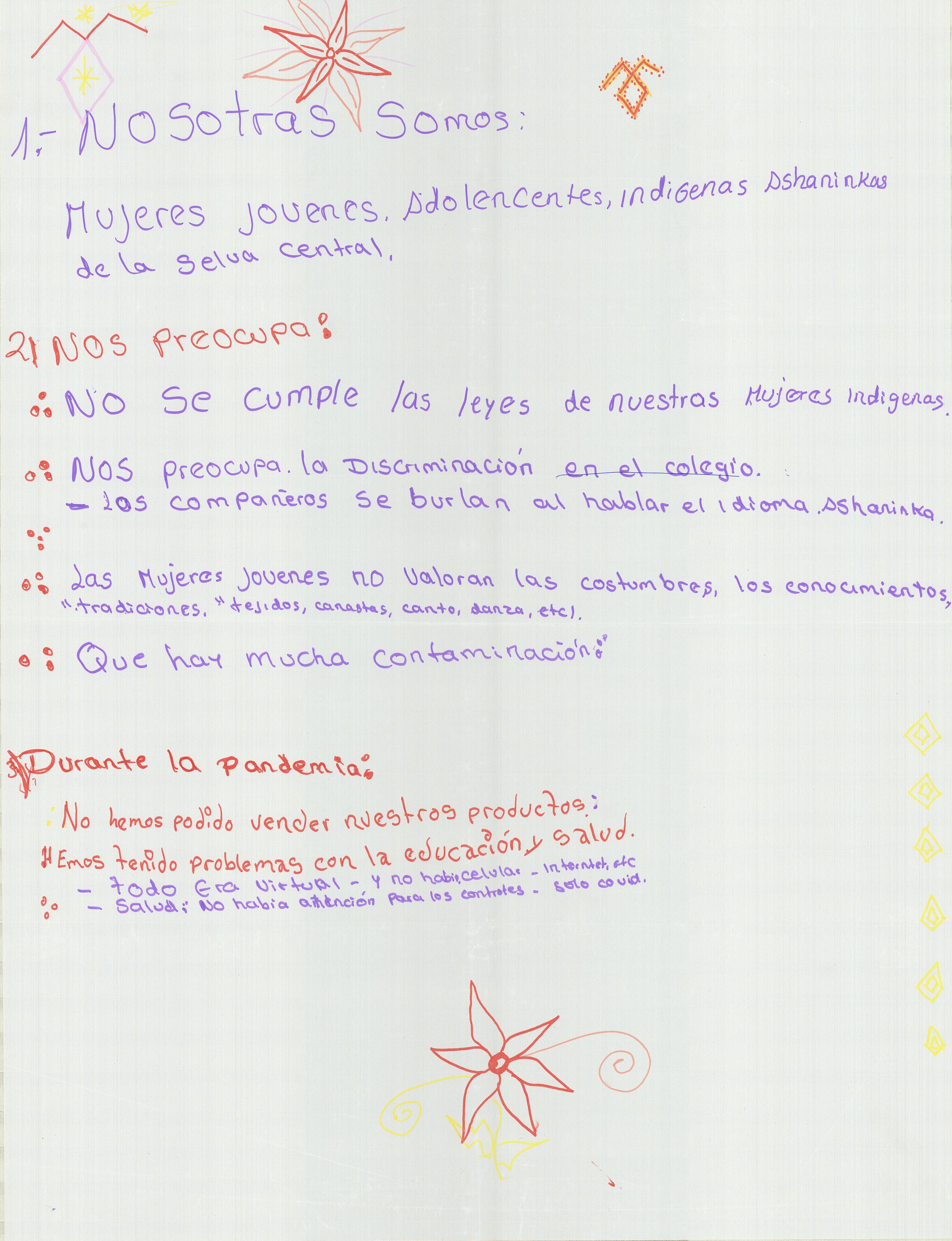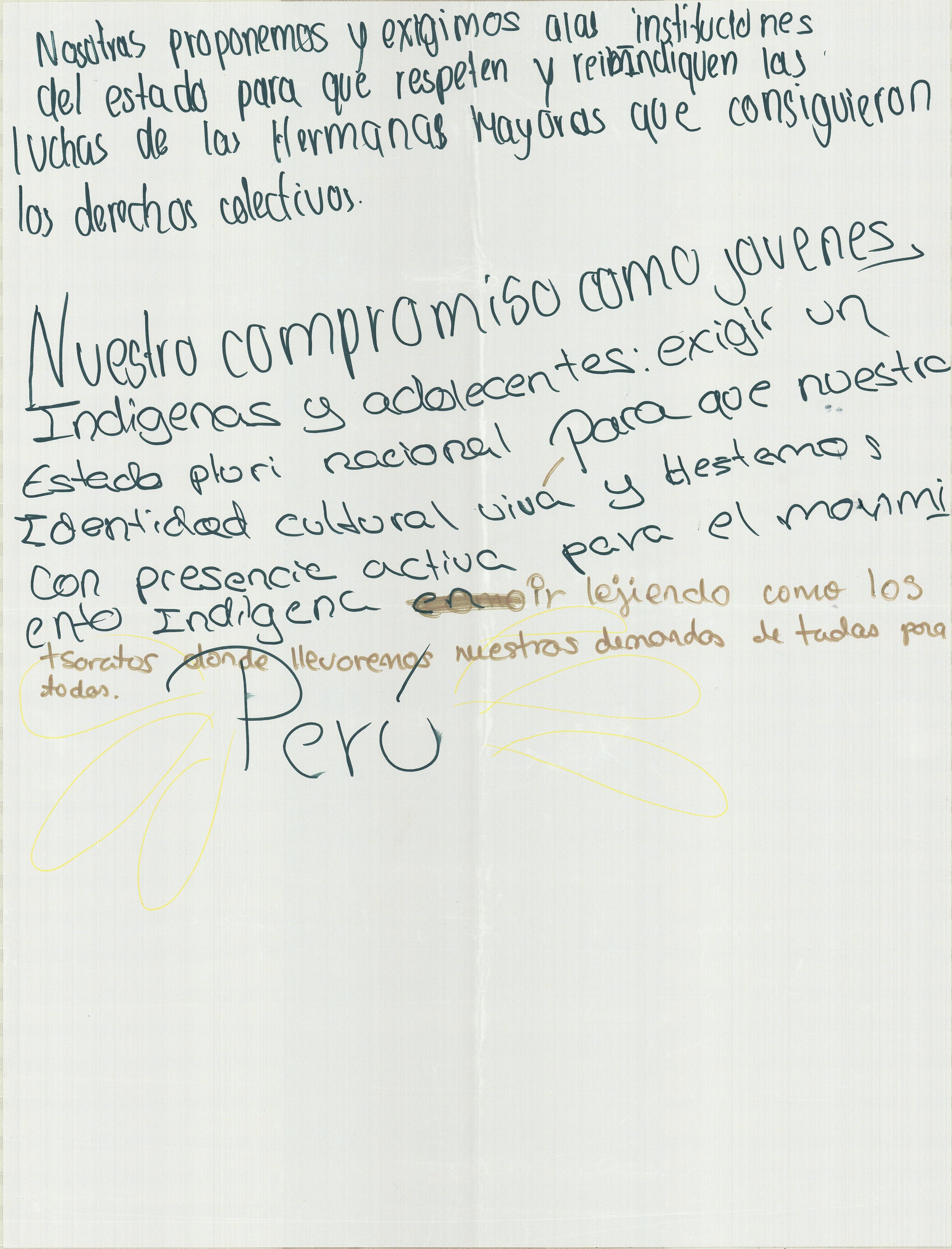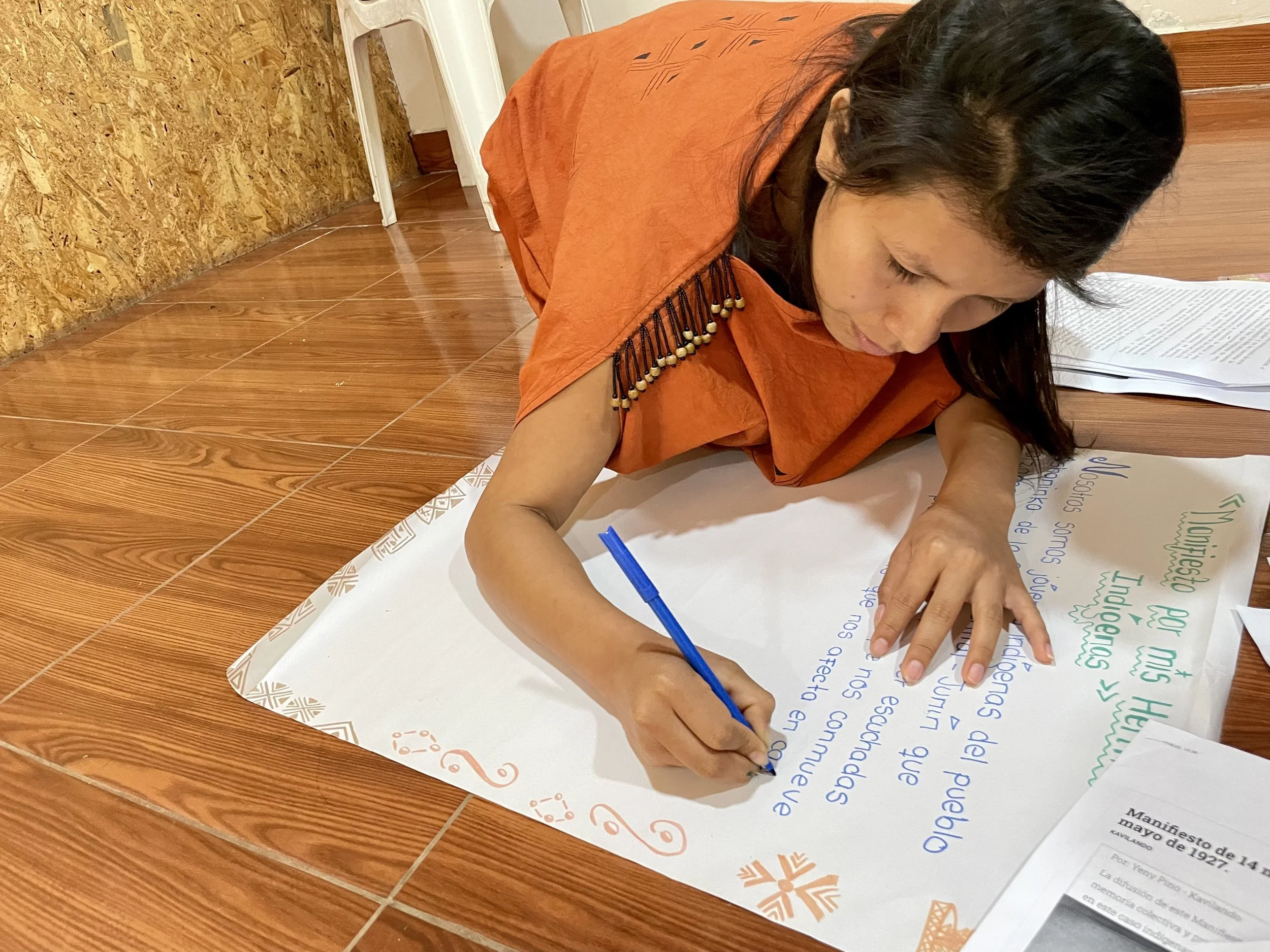
Manifesto
During our second fieldwork visit to Junín in August 2021, we spent time supporting the OMIAASEC hermanas to develop their own manifesto of concerns. Ideas were developed and discussed in workshop format through individual and groupwork, initial results of which are shown here.
The various ideas and designs were then brought together to create a document, shared and agreed with the group.
This manifesto forms the basis and inspiration for conversations with local, national and international stakeholders about the urgent needs of the indigenous communities (Asháninka and Yanesha) of the Central Amazon of Peru, from the perspective of the young women leaders of OMIAASEC.





MANIFESTO FOR THE NEW INDIGENOUS GENERATIONS:
HEAR US! OURS ARE THE NEW VOICES
We are young and adolescent Asháninka and Yánesha women, granddaughters of the indigenous warriors that resisted in an organised manner in our ancestral lands in the Selva Central of Peru.
Today, our families, our wise women and mother nature herself give us the energy and knowledge we need to shed light on the damages and discrimination that we suffer. The difficulties that affect each and every one of our communities move us to take this opportunity to raise our voices so that we are heard and we can defend our rights.
We worry for our land and our identity
We worry that colonisation continues to impose its development, language, religion and economic model on us. The rivers, forests and ojos de agua or natural springs, are sacred sites in our ancestral lands and they are being destroyed, sold and polluted. What will happen in the not so distant future? There will be nothing left for our generation and those to come. The laws that protect us are merely written words, when not even our own State reads them or upholds them.
For many years, our brothers were deceived by the colonisers in order to sell our land; exchanging territory for shotguns, which they preferred to our arrows, or for alcohol, that they drank instead of masato. Our brothers were made to sign papers and later when their children tried to reclaim their land, they were told, "No. We bought it all”. The colonisers took advantage of the relationship they had with the indigenous communities.
There are still a number of our governing bodies and ourselves who continue to be deceived even now. They no longer make us sign papers, but they trick us with money in exchange for nature. Institutions tell us to, “Plant oranges, pineapples and ginger which will bring you money”, but we see that this does not happen. Instead, the soil deteriorates and there is little economic gain for the families. In the last few years, our situation has worsened further after not being able to sell our traditional products due to the restrictions put in place during the pandemic. Companies now want us to sell them our ojos de agua on top of everything else. To that, we simply ask: What are we to do with that money if we do not have water?
We see that there are no limits to how far discrimination can reach. Our mothers go to live in chacras out in the country to avoid being looked down on and being called “Indians” for wearing the traditional cushma in the cities. The very cities that were built by foreigners on top of our ancestral land, without us ever discriminating against them.
Our classmates make fun of us when we speak in our Asháninka or Yánesha languages in school. State education does not correspond to our realities. Children do not see themselves in the books they read about animals and foreign coastal locations. Nor do they have mobiles phones or internet access in order to follow their virtual classes.
Not even healthcare institutions cater to our needs. They hand out pills, give us injections without informing us of the reason why or deal with us only when it suits them. Expectant mothers and children did not receive the check-ups they needed; they were forgotten during the pandemic. Our natural medicine was left on the side-lines to make space for the doctors and nurses.
To avoid being ashamed of their parents or cheated by others, young people from our communities are turning their backs on our customs, knowledge and traditions, which consist of indigenous Amazonian ancestral science and technology. They don't want to learn how to spin yarns, knit, cure ailments using plants, reforest the land or speak the language. They are embarrassed and they are scared of the mocking that they could receive. It saddens us to know that they are losing touch with our cultural identity. They no longer raise awareness of who we are, nor do they show importance of where our blood flows from.
We dream of being the generation that raises its voice and is heard
We long for our generation to raise its voice for our land and for more young people to come together to learn about our aims as indigenous women. Like the congona tree that stands above all and feeds the small feathered chihuaco with its fruit, our vision is to plant the seeds that will bloom and remain strong to nourish those who follow.
As usual, proprietors or "civilised" people pay no heed to what our mothers, fathers and authorities ask for. We raise our voices to be heard. We want to be heard so that people know of our communities and organisations, our rights and troubles; so that we are given our space and given the help we need to become stronger. We want to be heard so that the State recognises our agenda and our proposals as young people; as women; and as part of a community and a people.
We want to be heard so that our sacred sites are taken care of and everything that represents us as indigenous people, as Asháninka and Yánesha people, is valued. The pandemic brought illness and death, but in the middle of it all we learned to recognise our wealth. In the Selva Central we have our own pharmacy made up of therapeutic plants, our own traditional dishes, the meat of woodland animals, and the agave and banana groves that we plant. Even those who left returned to their communities out of fear of falling ill and simple necessity; they returned to their roots. Our mothers, grandmothers and ourselves, used medicinal plants, such as eucalyptus and matico, to cure ailments. That is how we relearned their value. Stories were sung while drinking masato and chewing coca leaves, without alcohol.
We search for justice for our brothers and sisters, mothers, grandmothers and ancestors that are no longer with us. It is time for the Peruvian State to respect and make up for the battles that our grandmothers and older sisters, members of our Organización de Mujeres Indígenas Asháninkas de la Selva Central (Omiasec - Organisation for Indigenous Asháninkas Women of the Selva Central) and its mother Organización Nacional de Mujeres Indígenas Andinas y Amazónicas del Perú (Onamiap - National Organisation for Indigenous Women of Andean and Amazonian Peru), who, creating paths through colonisation, racism and machismo, fought for our collective rights. They spoke in the face of the silence of our brothers and they put up a resistance. It is thanks to them that we also have our own history.
We are now young people, but when we have our own daughters who will form the next generation, we will continue to tell of our history and how we have endured our own battles to reclaim what is ours.
In the face of individualism, we propose sharing
We propose making ourselves stronger together and sharing amongst our communities. Individualism has meant that every person thinks only about themselves, but there are some communities in which we still value sharing and each person gives willingly. The cities depended and continue to depend on our chacras and land to feed themselves and to survive during the pandemic. We have not refused the needs of others.
In spite of that, the cities and industries have not stopped polluting our land that have kept them fed in the past and continue to do so now: drainpipes, car washes, gold mining and pig breeding grounds all contaminate the waters of the Chanchamayo, Perené, Satipo and Ene rivers and the tributaries that connect to them. State institutions should take measures against this pollution.
That way we can tell our brothers and sisters in the cities and other communities to not throw their trash and plastics into the ravines where fish, shrimp and crabs feed. We have to share amongst all living creatures and reconnect with nature.
The State, which neither knows nor believes us, needs to visit our communities to understand our difficulties. That way we will have the chance to be seen in the fields where we work and by recognising us, the State will be able to give us greater importance and share with us.
We pledge to continue uniting forces and putting down roots
At this point in history, as young Asháninka and Yánesha women, we pledge to continue uniting forces, because together we will be like the ever-flowing stream feeding into bigger rivers, that not only runs from the native communities and chacras towards the city, but also returns.
Together we will continue to lay roots, absorbing the knowledge that our ancestors left us. We will continue to weave mats, baskets and jebarontsi: using cushmas; evaporating shalanka and parivana, and learning the songs that cure mal de aire, chacho and other illnesses; practising the Asháninka and Yánesha languages; and preparing masato and chipa to share. We will not forget our wise grandmothers.
Together we will carry on inviting more and more young people so that we have an active and organised presence in the indigenous movement. Following the example of our elders, we will continue to sow seeds of knowledge about mother nature to allow for kametsa asaike or the knowledge of what makes for a good harmonious life. Our audio-visual documentaries and this manifesto combine in demonstration of this resistance from our world view.
Together we will continue to knit tsaratos within which we will carry the demands of every one of us to the Peruvian government, to demand a multinational state in which our lands are recognised and our cultural identity continues to thrive.
Pasonki, brothers and sisters. Thank you.
San Ramón, Selva Central, Peru
21st August 2022
